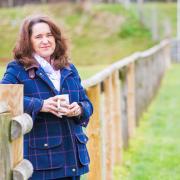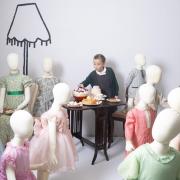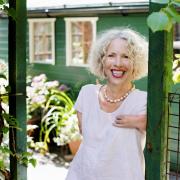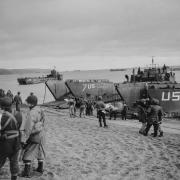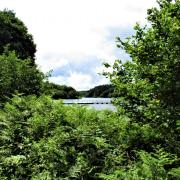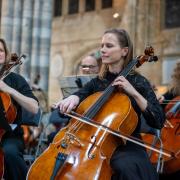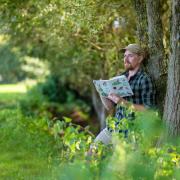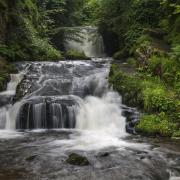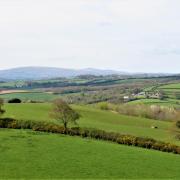In the 1920s and 30s, civic theatres were thriving in cities and towns all around the country. They were hugely popular at a time before cinema-going exploded with the advent of sound and then colour, and long before televisions became affordable for everyone.
Live entertainment such as music, comedy and drama were on the bill. There were pantomimes at Christmas and summer seasons offering a healthy helping of variety. But tastes changed and by the 1980s many of these council-run theatres had fallen out of favour.
Babbacombe Theatre on picturesque Babbacombe Downs overlooking the clear waters of Tor Bay on the English Riviera was typical of the civic theatre in terms of design and content. It looked as if it would suffer the same fate as many others when the council decided to close it in the 1980s.

Colin Matthews had other ideas. The son of a teacher, his first job was in insurance and his brother, Barrie, went into banking. They both got fed up with what they were doing and decided the nightclub business would be more fun and with younger brother Paul they turned Shiphay Manor in Torquay into a successful business and they soon expanded with further clubs and pubs.
Bolstered by this success and with a keen interest in the theatre, Colin saw an opportunity when the council decided to close the Babbacombe Theatre in 1986.
While still in the club business, he had been appearing in semi-professional plays at the Palace Theatre and pantos at the Festival Theatre and, following on from booking acts for the clubs, he started promoting shows at the Princess and Festival theatres.

‘So when Babbacombe was threatened with closure after it had several bad seasons,’ he recalls. ‘I decided to take the plunge. I’d always been better at encouraging acts how to do it rather than doing it myself so I just had to make things happen. It took a few years to get it right, but it’s done extremely well.’
The first couple of seasons were tough. Colin lost a lot of money and ended up selling his house. ‘I soon discovered which wasn’t the way to go. I made my mind up I was going to make it work and I wasn’t going to give up. I thought a lot about what wasn’t working and how to attract audiences.
‘In the 80s and 90s, the summer season would run from May to September and we had shows on five or six nights a week. Now we start in February and do two or three nights during the middle of the week and finish in October,’ Colin explains. ‘At the weekends we can bring in touring shows. Comedians do very well, people that have been in shows like Mock the Week on television – Ed Byrne, Henning Wehn are both popular. Some comedians will come here to warm up for bigger tours. They love the space because it’s very intimate, around 600 seats. At a lot of venues there is a huge expanse between the audience and the performer, but here there is no orchestra pit.’

Times – and tastes – change. The traditional seaside holiday was replaced by people travelling abroad. There is a real sense that Colin and his small team led by general manager Sharon Waring are bucking the trend.
‘Seaside towns like Newquay, Barnstaple, Torquay, Exmouth, Swanage – they all had little theatres and promoters would take their shows around to different venues. Many people would go on holiday because of what was on at the theatre. Most of those seaside theatres are closed now but we are still here because we are putting on the shows that attract the holidaymakers and the locals.
‘At bigger theatres you get bigger names and more lavish shows, but our audience like what we do – a top comedian, a specialty act, four vocalists and six dancers. It has a variety feel but it has a modern, fast tempo. We have built up a rapport with the hotels where people on short breaks can have a night at the theatre. Some of the feedback we have received tells us it’s the highlight of their week for many. For our main seasonal show, a lot of people come with their families and there are older visitors in their 50s, 60s and 70s. There’s no rude words or swearing so parents aren’t coming away embarrassed.’

Colin puts the shows together himself. He casts them and directs them and watches intently from the back of the auditorium.
The professional performers appear at other venues such as hotels and holiday parks. ‘Most of them will have gigs on a Friday and Saturday, so working Tuesdays and Wednesdays is good for them,’ says Colin. ‘They can put 80 dates in their diary and then finish in October in time for Christmas shows.’
The Babbacombe Theatre is totally unsubsidised and was badly hit by lockdown closures, although they did get some help from the Arts Council for the first time.
‘We have had to be a bit more cost conscious. There is a fine line in the theatre between making a profit and making a loss,’ he adds. ‘We had a really good year in 2019 and this year I believe 100 per cent that we will be back to normal. There are more people in The Bay and wanting to come to the theatre. We do need to encourage the coach business back to Torquay.’
Colin is 77 now but says he doesn’t worry about the future of this privately-owned theatre. ‘People will carry it on in some way and my legacy will be what I have already achieved,’ he says, smiling. ‘I’ll carry on, I have a few years left yet. I have this overwhelming feeling that it was worth buying the theatre all those years ago. And I couldn’t have done any of it without my wife, Maggie. She has been a real inspiration through the years. She’s the reason why I have been able to carry on doing this.
‘All I want to do is make sure people who come to Babbacombe are having a good time.’
HUMBLE BEGINNINGS
In the 1920s a small bandstand stood on the site now occupied by the Babbacombe Theatre. Pre-war audiences had to brave the wind and rain to watch the musicians, who were protected by a canvas awning. In 1938 Torquay Town Council built Babbacombe Downs Concert Hall at a cost of £8,000 and it remained virtually unchanged for almost half a century.
The first concert was on the afternoon of May 27, 1939 with the Ernest Gross Municipal Orchestra and BBC baritone John Steabben, followed that evening by the opening night of the first summer show, Cabaret Revels with tickets starting at 6d. During the Second World War it was requisitioned as a lecture theatre for RAF crews with the occasional show by ENSA (Entertainments National Service Association) and military bands. In the 1950s, audiences could spot the stars of tomorrow on the way up.
People like all-round entertainer Bruce Forsyth, magician David Nixon and comedians Ted Rogers, Ray Allen, Norman Vaughan and Roy Hudd. The theatre thrived during the following decades until the early 1980s when the council decided to bring the curtain down.




